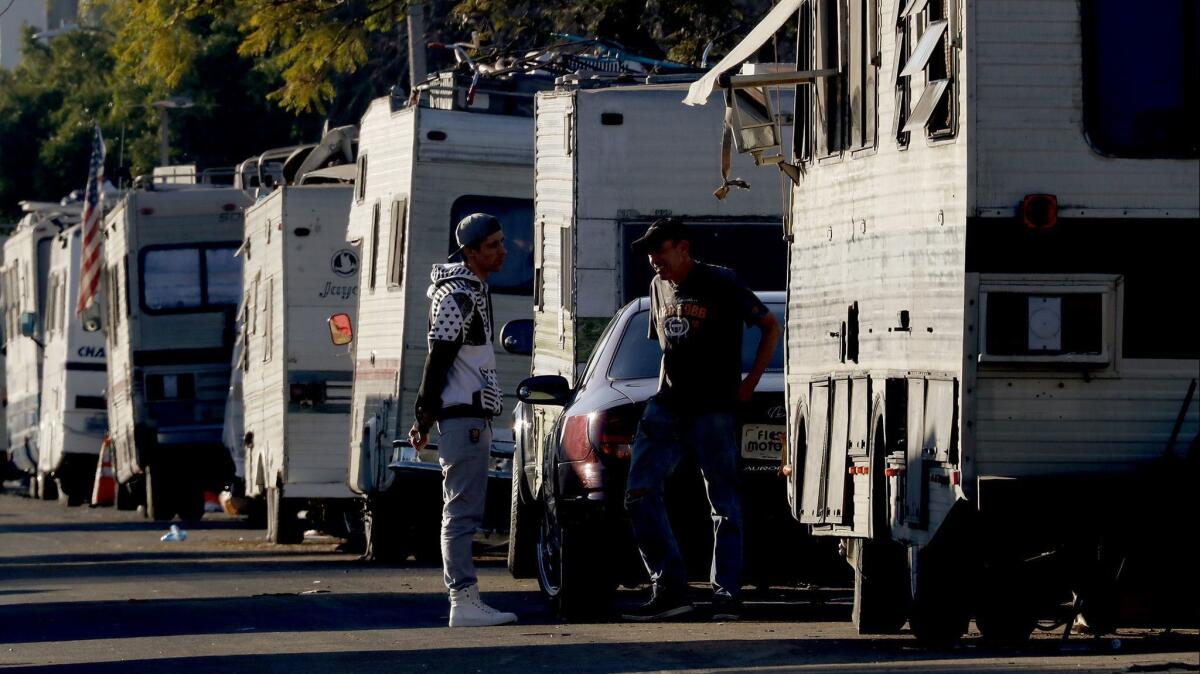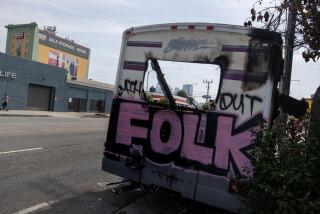Towing a car can be financially ruinous. Should California cities do it anyway?

Over the objections of anti-poverty advocates, Los Angeles council members on Tuesday came out against legislation that would prevent California cities from towing vehicles left on the street for more than 72 hours.
The bill, introduced in Sacramento by Assemblyman David Chiu (D-San Francisco), would prevent cities from impounding cars with five or more unpaid parking tickets, or registration that is six months out of date.
The City Council heard nearly two hours of heated, sometimes angry, public debate before opposing the bill on a 12 to 1 vote. Some members said they would support an end to towing for unpaid parking tickets and expired registration, but not for cars left parked on the street for more than three days.
“The idea that you’d just stop enforcing the 72-hour hold is completely unconscionable,” said Councilman Marqueece Harris-Dawson, who represents South L.A., saying it keeps parking under control in neighborhoods starved for street spaces.
But, he said, imposing “a monetary penalty on people we know don’t have money seems to be among the silliest things we do.”
The decades-old towing law is one of many to take on new significance as California grapples with an unprecedented housing crisis. Rising rents and stagnant wages have squeezed household budgets and left thousands of people living in cars, camper vans and RVs.
Nearly 60,000 people are homeless across Los Angeles County, including more than 16,500 people living out of their vehicles, according to data released last week. In the city of Los Angeles, overall homelessness soared 16% to 36,000 people since last year.
“We care about those 36,000 people,” said Councilman Greig Smith, who represents the northwest Valley and urged opposition to the state legislation. “But we have four million other people we care about, too.”
Stripping local control from towing practices would destroy L.A.’s ability “to keep our communities clean and safe,” Smith said. Amid a smattering of boos, he said the legislation would make the city’s problems worse.
“You make it worse!” a woman shouted from the back of the audience.
Advocates for low-income residents alternately begged and scolded city officials, saying repealing towing practices would stop people from sliding into homelessness.
Towing and impound fees can financially devastate poor residents who rely on cars to get to work and school, they said; others can’t afford vehicle registration fees that now top $130 annually.
Poor residents “can lose their livelihoods because of one mistake,” such as forgetting about street sweeping or letting a parking meter run out, said Guillermo Barrantes of Public Counsel, a legal aid nonprofit.
Retrieving a towed car from one of L.A.’s impound garages comes at a hefty cost. The city charges $133 for the tow, $115 to release the vehicle, and a $45.65 fee for each day the car is in storage. The fees mount so quickly that some people never retrieve their cars.
“It is insane that we live in one of the most liberal cities in the country and we’re opposing this bill,” said Rebecca Lieb, 30, of Montecito Heights, her voice rising in frustration. “I’m aghast at all the people here talking about their quality of life. If you care so much about this, what have you done about the homeless crisis?”
In a statement, Chiu said it was ironic that Los Angeles supported “towing practices that are pushing tens of thousands of working families into poverty and homelessness” so soon after the results of the homeless count.
He said he was “happy to continue engaging with L.A. leaders to make this bill more workable.”
Westside Councilman Mike Bonin, the only council member who did not oppose the bill Tuesday, said he would support repealing towing practices for expired registration and unpaid parking tickets because “most people who have unpaid tickets are doing so because they cannot pay them.”
The city’s legislative analysts said 19,482 vehicles in Los Angeles have five or more unpaid parking tickets, and the drivers owe a collective $23,899,033.
The Transportation Department has a program that allows homeless people to work off the cost of parking tickets by performing community service. The city said 610 people have participated and worked off $240,373 worth of citations.
But repealing the 72-hour rule could exacerbate problems in the city, said Bonin and other council members.
The 72-hour policy is used to address complaints about auto body shops that store wrecked cars on side streets, travelers who leave their cars in neighborhoods near Los Angeles International Airport to avoid high parking fees and long lines of RVs belonging to homeless residents.
Without those laws, residents said, neighborhoods could see an increase in crime and vandalism linked to abandoned cars, and sanitation problems from RVs whose owners empty human waste onto sidewalks.
“The needs of our working community continue to be ignored and neglected,” said Sandra Soto, a block captain for a neighborhood watch group in Panorama City. She said it was “shameful” that some laws that have been on the books for decades could be ignored now that non-white residents were moving into middle-class areas.
Chiu’s office said the bill would not prevent cities from enacting their own laws to address abandoned, wrecked or inoperative vehicles.
Los Angeles has received an average of 120,000 complaints about abandoned vehicles over the last three years, the Transportation Department said.
When a complaint about an abandoned vehicle comes in, parking officers find the vehicle and mark a tire with chalk. If the mark is still visible 72 hours later, the officer leaves a ticket, including a parking fine. If the vehicle is still there 24 hours later, it’s towed.
About 94% of complaints are resolved when the car is moved, the city said, while about 6% result in a tow. The city generally does not tow RVs and has a policy against towing vehicles that are occupied, officials said.
“There is no immediate threat to an individual on the street,” said Richard Rea, the deputy chief of parking enforcement. “All they need to do is comply with the law.”
For more transportation news, follow @laura_nelson on Twitter.
More to Read
Sign up for Essential California
The most important California stories and recommendations in your inbox every morning.
You may occasionally receive promotional content from the Los Angeles Times.











